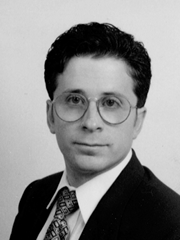
![]()
| Assistant Professor Electrical Engineering College of Engineering Arizona State University Box 877606, GWC 612 Tempe, AZ 85287-7606 Phone: (602) 965-3712 |
 |
||
|
Armando A. Rodriguez
|
|||
|
|
|||
| Description of Research | |||
| Dr. Rodriguez's primary research interests lie in the development of a practical theory for controlling nonlinear distributed parameter systems. He has recently pioneered new techniques for addressing systems with multiple hard nonlinearities. These techniques have been successfully applied to enhance the performance of missile guidance and control systems. In addition to pursuing aerospace applications, Dr. Rodriguez is interested in smart/flexible structures and IVHS applications. He is currently leading an effort, sponsored by the INTEL Corporation, dedicated to the design and implementation of new algorithms for reentrant semiconductor manufacturing facilities. During the past year, Dr. Rodriguez has developed and managed a multi-disciplinary research program, involving over 25 minority students, focused on Modeling, Simulation, and Graphical Visualization of Dynamical Systems. This effort has been supported by the Coalition to Increase Minority Degrees, the National Science Foundation, the ASU Center for System Science and Engineering, and the ASU Center of Improving Engineering Education. |
|||
| Recent Papers or Publications | |||
| Rodriguez, A. A. and M. A. Dahleh, "On the Computation of Induced Norms for Non-Compact Hankel Operators Arising From for Distributed Control Problems," Systems & Control Letters (19), 1992, pp. 429-438. Rodriguez, A. A. and R. Aguilar, "Graphical Visualization of Missile-Target Air-to-Air Engagements: An Educational Tool for Designing and Evaluating Missile Guidance and Control Systems," Journal of Computer Applications in Engineering Education, Vol. 3, No. 1, 1995, pp. 5-20. Rodriguez, A. A., "Weighted Hƒ Mixed-Sensitivity Minimization for Stable MIMO Distributed Parameter Systems," accepted for publication in the IMA Journal of Mathematical Control and Information, March, 1995. |
|||
| Special Honors or Awards | |||
|
|
|||
Sponsored by the MIT Provost's Office
Last updated on 8/23/2000 by www-deanofcollege@vassar.edu
